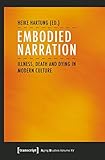Embodied Narration : Illness, Death and Dying in Modern Culture / ed. by Heike Hartung.
Material type: TextSeries: Aging Studies ; 15Publisher: Bielefeld : transcript Verlag, [2018]Copyright date: 2018Description: 1 online resource (260 p.)Content type:
TextSeries: Aging Studies ; 15Publisher: Bielefeld : transcript Verlag, [2018]Copyright date: 2018Description: 1 online resource (260 p.)Content type: - 9783839443064
- Ageism
- Aging Studies
- Body and Embodiment
- Culture
- Death in literature
- Decay
- Diseases in literature
- Gender Studies
- General Literature Studies
- Health
- Literary Studies
- Literature
- Narration (Rhetoric)
- Narrative Theory
- body
- cultural studies
- Ageism
- Aging Studies
- Body and Embodiment
- Body
- Cultural Studies
- Culture
- Decay
- Gender Studies
- General Literature Studies
- Health
- Literary Studies
- Literature
- Narrative Theory
- SOCIAL SCIENCE / Gerontology
- Ageism
- Aging Studies
- Body and Embodiment
- Body
- Cultural Studies
- Culture
- Decay
- Gender Studies
- General Literature Studies
- Health
- Literary Studies
- Literature
- Narrative Theory
- 612.67 23
- Internet Access AEU
- online - DeGruyter
| Item type | Current library | Call number | URL | Status | Notes | Barcode | |
|---|---|---|---|---|---|---|---|
 eBook
eBook
|
Biblioteca "Angelicum" Pont. Univ. S.Tommaso d'Aquino Nuvola online | online - DeGruyter (Browse shelf(Opens below)) | Online access | Not for loan (Accesso limitato) | Accesso per gli utenti autorizzati / Access for authorized users | (dgr)9783839443064 |
Frontmatter -- Content -- Acknowledgements -- Introduction: The Concept of Embodiment in Modern Culture -- Embodied Narrations of the End of Life: Toward A Thanatological Biopolitics of Modern Culture -- ‘About Suffering They were Never Wrong, The Old Masters’: Human Pain and the Crucible of Representation -- How We Imagine Living with Dying -- Disgust in Samuel Beckett’s Molloy -- ‘Blue with Age’: Dis- and Dys-appearance of the Body in Eudora Welty’s “A Worn Path” -- Growing Bodies: Narrating Death and Sexuality in Contemporary Young Adult Fiction -- When Mother Is Dying: Miljenko Jergović’s Kin -- Storytelling in the Age of AIDS: Narrative Possibilities and the Exigencies of Loss in Dale Peck’s Martin and John. A Novel -- Realism and the Soul: The Philosophy of Virginia Woolf’s Illness -- The Illness Is You: Figurative Language in David Foster Wallace’s Short Story “The Planet Trillaphon” -- Reading the Assault on the Lived Body in Hilary Mantel’s Giving up the Ghost -- Contributors
restricted access online access with authorization star
http://purl.org/coar/access_right/c_16ec
Do liminal embodied experiences such as illness, death and dying affect literary form? In recent years, the concept of embodiment has been theorized from various perspectives. Gender studies have been concerned with the cultural implications of embodiment, arguing to move away from viewing the body as a prediscursive phenomenon to regarding it as an acculturated body. Age studies have extended this view to the embodied experience of ageing, while drawing attention to the ways in which the ageing body, through its materiality and plasticity, restricts the possibilities of (de)constructing subjectivity. These current debates on embodiment find a strong counterpart in literary representation. The contributions to this anthology investigate how and to what extend physical borderline experiences affect literary form.
Mode of access: Internet via World Wide Web.
In English.
Description based on online resource; title from PDF title page (publisher's Web site, viewed 26. Aug 2024)


